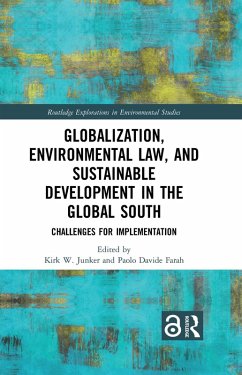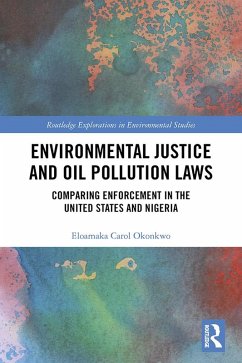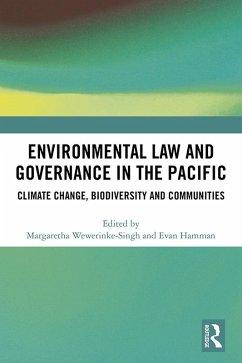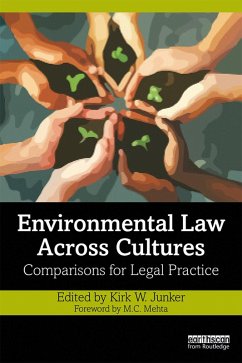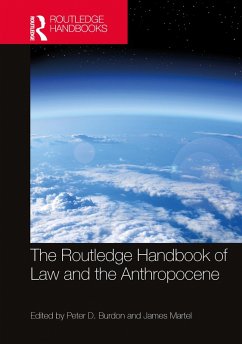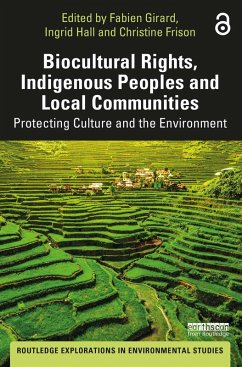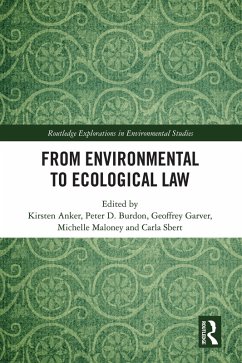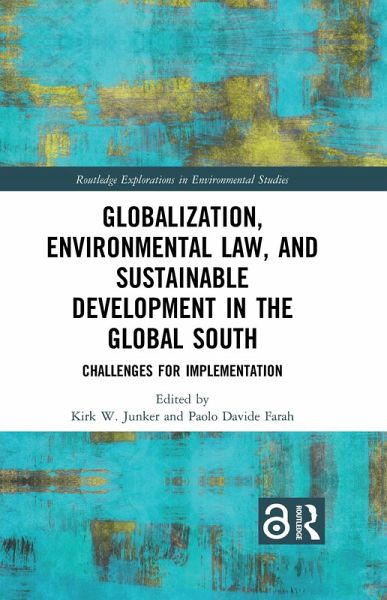
Globalization, Environmental Law, and Sustainable Development in the Global South (eBook, ePUB)
Challenges for Implementation
Redaktion: Junker, Kirk W.; Farah, Paolo Davide

PAYBACK Punkte
0 °P sammeln!
This volume examines the impact of globalization on international environmental law and the implementation of sustainable development in the Global South.Comprising contributions from lawyers from the Global South or who have experience in the Global South, this volume is organized into three parts, with a thematic inquiry woven through every chapter to ask how law can enable economies that can be sustained, given the limited carrying capacity of the earth. Part I describes and characterizes the status quo of environmental and economic problems in the Global South during the process of globali...
This volume examines the impact of globalization on international environmental law and the implementation of sustainable development in the Global South.
Comprising contributions from lawyers from the Global South or who have experience in the Global South, this volume is organized into three parts, with a thematic inquiry woven through every chapter to ask how law can enable economies that can be sustained, given the limited carrying capacity of the earth. Part I describes and characterizes the status quo of environmental and economic problems in the Global South during the process of globalization. Some of those problems include redistribution of environmental burden on the public through over-reliance on the state in emerging economies and the transition to public-private partnerships, as well as extreme uncontrolled economic expansion. Building on Part I, Part II takes an international perspective by presenting some tools that are in place during the process of globalization that lead to friction and interfaces between developed and developing economies in environmental law. Recognizing the impossibility of a globalized Northern economy, the authors in Part III present some alternatives through framework ideas of human and civil rights, environmental rights, and indigenous persons' rights, as well as concrete and specific legal tools to strengthen justice and rule of law institutions. The book gives new perspectives to familiar approaches through concrete examples by professional practitioners and theoretical discourse by academic researchers, and can thereby form the basis for changes in practices, as well as further discussions and comparisons.
This book will be of great interest to students and scholars of environmental law, sustainable development, and globalization and international relations, as well as legal professionals and practitioners.
Comprising contributions from lawyers from the Global South or who have experience in the Global South, this volume is organized into three parts, with a thematic inquiry woven through every chapter to ask how law can enable economies that can be sustained, given the limited carrying capacity of the earth. Part I describes and characterizes the status quo of environmental and economic problems in the Global South during the process of globalization. Some of those problems include redistribution of environmental burden on the public through over-reliance on the state in emerging economies and the transition to public-private partnerships, as well as extreme uncontrolled economic expansion. Building on Part I, Part II takes an international perspective by presenting some tools that are in place during the process of globalization that lead to friction and interfaces between developed and developing economies in environmental law. Recognizing the impossibility of a globalized Northern economy, the authors in Part III present some alternatives through framework ideas of human and civil rights, environmental rights, and indigenous persons' rights, as well as concrete and specific legal tools to strengthen justice and rule of law institutions. The book gives new perspectives to familiar approaches through concrete examples by professional practitioners and theoretical discourse by academic researchers, and can thereby form the basis for changes in practices, as well as further discussions and comparisons.
This book will be of great interest to students and scholars of environmental law, sustainable development, and globalization and international relations, as well as legal professionals and practitioners.
Dieser Download kann aus rechtlichen Gründen nur mit Rechnungsadresse in A, B, BG, CY, CZ, D, DK, EW, E, FIN, F, GR, HR, H, IRL, I, LT, L, LR, M, NL, PL, P, R, S, SLO, SK ausgeliefert werden.




